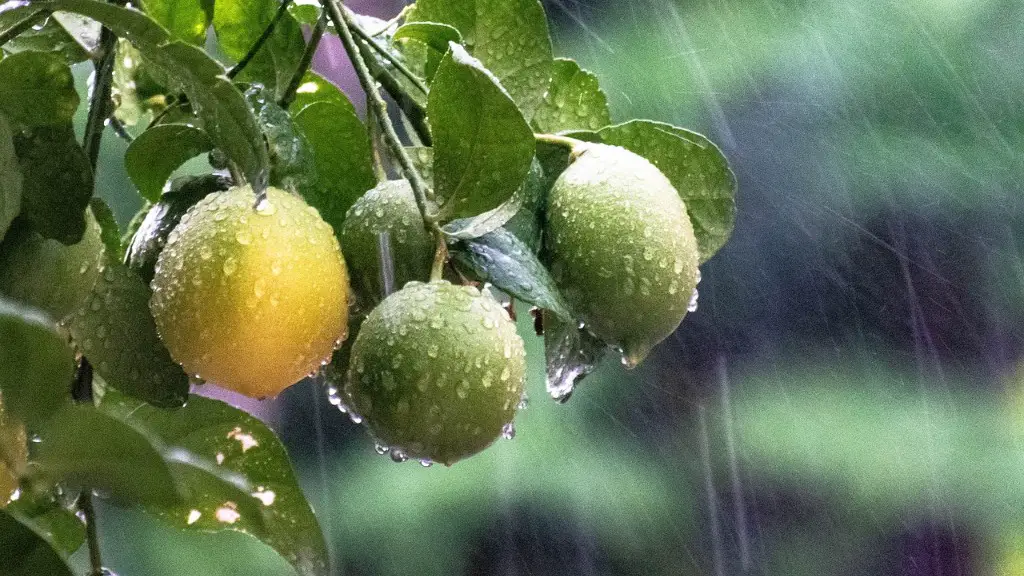Background Information
Avocado trees are an evergreen perennial fruit tree producing a highly nutrient-rich fruit due to its high oil and vitamin content. Avocado trees can live for up to fifty years, producing a large number of avocados in their lifetime. Generally smaller than other fruit trees, they can reach between 10 and 20 feet tall. The trees can grow in both tropical and semi-tropical climates, leading to their recognition as one of the most widely grown fruit varieties.
How Far Can An Avocado Tree Bear Fruit
Avocado trees generally offer up fruit alongside foliage and a thick trunk in their maturity. Fruiting can begin as early as three to four years into the tree’s lifespan, producing avocados within the first year of fruiting stages. This period can sometimes be extended to as long as six to eight years depending on the age of the tree when planted, weather and growing conditions affecting the tree.
The number of years that a tree will bear fruit varies depending on the variety of tree, with some trees fruits sometimes coming as soon as two years after planting. There are several types of avocado trees, with nine varieties such as Fuerte, Zutano, and Hass, with each possessing its own production lifespan. As a standard rule, however, avocados will continue to be produced throughout the tree’s entire life no matter the variety as long as there are no external environmental factors that damage the trees produce.
Pollination And The Number Of Avocados Produced
Pollinated flowers of an avocado tree are a major determiner in the amount of fruit produced. An avocado tree requires optimal temperatures of between 60°F and 85°F to bear fruit. They also require pollination, with bees providing the ideal pollinators. Low temperatures, inaccessible pollinators, and poor soil conditions can affect the trees production, drastically changing the number of avocados produced in a season.
h2>Pruning And The Lifespan Of A Tree
An avocado tree with proper pruning can extend the tree’s lifespan and increase the number of avocados produced. As pruning allows the tree to focus its energy to provide support for fruit bearing and encourages pollination leading to increased production. Pruning an avocado tree for the international avocado production can be done by removing over-crossing of the branches or falling to the ground setting the goals of no more than a sixth of the tree is to be removed.
Fertilizer And Water Requirements Of An Avocado Tree
Avocado trees require a baseline of key nutrients and water to produce a full crop season. Trees need adequate nitrogen, potassium, and phosphorus for optimal production and growth. Adequate watering also must ascend throughout the season of fruiting as water logging or insufficient watering can both reduce the trees production.
Disease and Pest Prevention
The spread of disease and pests can reduce the number of avocados produced and the trees overall lifespan, making pest and disease control essential steps in maintaining optimal avocado production. Some of the more common pests that can affect an avocado tree include the Grapefruit Moth, the Root knot Nematode, and the Whitefly. Insecticides and nematicides can be used to effectively reduce pest presence and to protect the tree.
Environmental Factors Affecting Avocado Production
Environmental conditions are essential to the production of avocados and any environmental changes, such as unseasonal rain, freezing temperatures, or extreme heat, can affect the number of avocados produced. Additionally, soil limitations and infertility can both drastically reduce the trees production, making the environment another factor in extending the number of years a tree will bear fruit.
Soil Nutrients
Soil nutrients affect avocado tree production and quality. An avocado tree needs balanced moisture and adequate nutrition in the soil. Avocado trees can take between one and two years to fully adjust to the soil type and its nutrients. Standard soil fertility should be composed of 1.1–1.3% nitrogen, 1.4–2.4% phosphorus, 1.1–1.4% potassium, and 0.5–1.2% magnesium.
Conclusion
Overall, the number of years an avocado tree will bear fruit can vary depending on the variety of tree, pollination, pruning, fertilization, water, disease, and environmental factors. If these factors are managed properly, an avocado tree can produce a large number of avocados for years. Proper attention and care must be paid to an avocado tree for it to have healthy and productive life.
